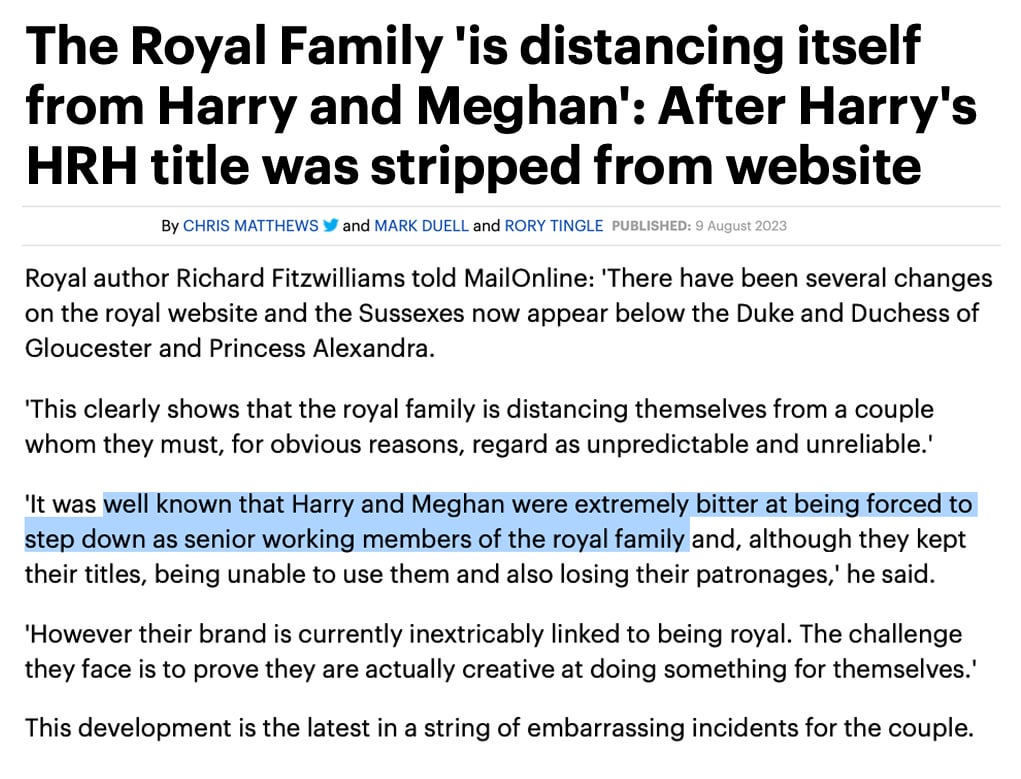In a riveting twist to the saga of Prince Harry and Meghan Markle, it appears that the British royal family, alongside MI5, took decisive action to prevent the couple from exploiting their royal titles for financial gain.
Recent revelations indicate that the intelligence agency uncovered troubling trademark applications linked to the Sussexes, raising alarms about potential threats to both national security and the monarchy’s reputation.
This scandal offers a rare glimpse into the intricate dance between royal duties and governmental oversight, shedding light on the motivations driving Meghan and Harry’s decisions.
The story begins with the couple’s wedding in May 2018, which quickly led them to explore commercial opportunities under the Sussex Royal brand.
By June 2019, they had applied for trademarks covering a wide array of products, including books and clothing.
This move sparked controversy, as working royals are traditionally expected to refrain from overt commercial endeavors.
Initially, the palace seemed willing to overlook these pursuits, perhaps hoping that the couple’s popularity could enhance the monarchy’s image and boost tourism revenues.
However, the landscape shifted dramatically when Harry and Meghan announced their intention to step back from royal duties in January 2020.
This unexpected decision sent shockwaves through the palace, prompting urgent negotiations over the terms of their departure.
Among the many contentious issues was whether they could continue to use the term “royal” in their branding.
Ultimately, an agreement was reached in February 2020, stipulating that they would abandon the Sussex Royal brand by March 31 of that year and repay public funds used for renovations at Frogmore Cottage.
What many did not realize at the time was that MI5 played a crucial role in hastening the couple’s exit from royal life.
Intelligence officials became concerned after monitoring the couple’s trademark applications, which appeared disproportionately expansive for a couple focused on philanthropic efforts.
Alarmingly, the Sussexes had filed claims in over 100 countries, suggesting a level of ambition that raised red flags within the intelligence community.
MI5’s scrutiny stemmed from its mandate to protect the UK’s economic and cybersecurity interests.
The agency routinely monitors global trademark applications to identify potential threats, such as economic espionage or covert infiltration disguised as commercial activities.
Analysts were particularly worried that foreign adversaries could exploit the Sussex brand for nefarious purposes, potentially using shell companies to divert funds or engage in intelligence-gathering operations.
The scale of the Sussexes’ trademark ambitions suggested a desire for profit that extended far beyond legitimate business interests.
MI5’s concerns prompted them to alert the palace and other government officials, emphasizing the need for swift action to mitigate any risks associated with Harry and Meghan’s commercial aspirations.
This intervention ultimately expedited the couple’s separation from royal duties and their use of the Sussex Royal brand.
While some speculate that Meghan envisioned building a global PR empire akin to the Kardashians, MI5’s intervention put a damper on those plans.
The agency’s concerns about foreign exploitation underscored the delicate balance between personal ambition and national security.
The fact that MI5 identified these issues solely through public records indicates that there may have been more significant dealings in the works that remained hidden from view.
This episode highlights the complexities surrounding Harry and Meghan’s departure from the royal family.
It raises questions about the extent to which they resisted relinquishing their commercial aspirations amid mounting pressure from government and palace officials.
The revelation of MI5’s involvement adds another layer to the narrative, suggesting that the stakes were higher than previously understood.
As Harry and Meghan navigate their new lives in America, they continue to face scrutiny over their business dealings and political statements.
Critics have raised concerns about potential conflicts of interest arising from their interactions with international figures.
While no direct accusations have surfaced, the couple’s approach to transparency has fueled ongoing debates about the appropriateness of their post-royal endeavors.
On one hand, supporters argue that Harry and Meghan deserve privacy and independence after enduring intense media scrutiny.
On the other hand, critics contend that their actions raise legitimate concerns about security and propriety.
This tension underscores the challenges of transitioning from royal privilege to civilian life while maintaining financial self-sufficiency.
The MI5 angle sheds light on the often-overlooked realities behind royal dramas, illustrating the intricate interplay between family dynamics, national security, and commercial interests.
As more details emerge, the long-term implications of MI5’s intervention in Harry and Meghan’s exit remain to be seen.
Their journey toward independence continues to unfold, accompanied by questions about the consequences of their choices in a world where royal connections still carry weight.










